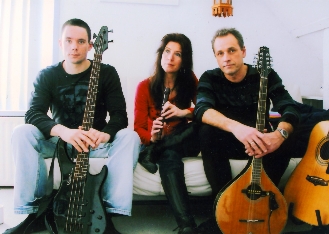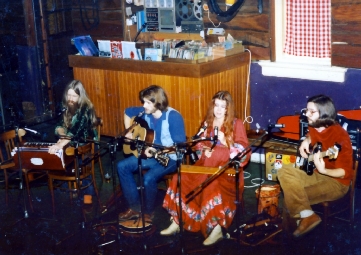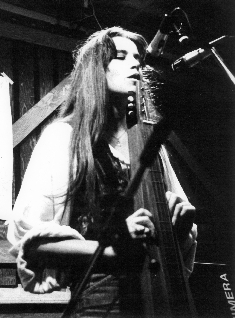
FolkWorld Issue 36 07/2008; Article by Eelco Schilder
Traditional Music in the Netherlands Part XI
Chimera - Symbol for Inspiration
At last a new episode in the series about Dutch (more or less) traditional music. This time the story of one of my personal favourites: the band Chimera. Together with the founders of the band, Marry and Bas Verkade, I look back at the glory times of the group during the late seventies and early eighties. The time they released both their LP’s and developed from an acoustic folk group into an experimental folk-rock band. They tell about the start and the abrupt end of the group at the height of their success.
The foundation of Chimera was laid in 1973 when both Marry and Bas were students. Together with bassist Ruud Schotting they played at their school’s Christmas party and in 1974 Bas and Marry decided to be a duo, both in music and in life. “We started as a duo singing English folk songs in the Pentangle and Gryphon style and country-rock in the Eagles and C, S & N style. We rehearsed at Marry’s house and soon her brother Koos joined us. As a trio we decided to call ourselves Chimera, a name we borrowed from a fairy tale by the Dutch author Couperus. In that story, named ‘Psyche’, Chimera is the symbol for inspiration. We played a few times, quite successfully, as a support act for a hard rock band, which included the Ruud mentioned above.

|
From that moment on, they slowly changed their repertoire from English to Dutch material. However, without having a history in Dutch folk music, they felt free to choose their own path. “We loved both symphonic groups like Genesis and folk groups like Malicorne. We were trying to create our own style and didn’t consider ourselves to be a traditional folk group. The period a text or tune came from was not important; we made ourselves familiar with it and used it as a means to express ourselves. Every member of the band had to be able to put his or her own ideas and creativity into the arrangements we made.”
With their first album, ‘Des duivels oorkussen’ (The devil’s pillow), they show themselves to be an acoustic band with a mysterious, rather medieval sound. Besides songs from the ‘Antwerp Songbook’, they record a poem from the late 19th century and a song about Daphne, the daughter of a goddess, who was turned into a tree so she could hide from the god Apollo. These subjects were very rare in the Dutch folk tradition. The album also contains an instrumental piece they wrote themselves, called Warris and lasting more than eight minutes. “This was our first composition that was recorded and it is a good example of our style at that time. The speed of the music varies, acoustic instruments are used in an experimental way and the melody is solemn. The album received favourable criticism and we noticed that people enjoyed the way we arranged our music. We loved what we were doing and all band members had, basically, the same ideas.”
Their second LP, called ‘Obstakel', was recorded shortly after their successful debut album. The atmosphere of this album is different from the first one. The, more or less, acoustic sound was replaced by a rock oriented sound. “Obstakel shows how we developed as a band. Don’t forget, we never intended to become a folk band and we liked several kinds of music. Actually, one of the things we wanted to achieve was to break away from traditional folk music.

Discography:
Some members of Chimera also are part of the 1e Hollandse Dans- |
“I do not really think the two albums differ all that much. Our method of working remained the same: we looked for something we liked and familiarized ourselves with it. Although the atmosphere is different because of the synthesizer and drums, we were in fact just developing our ideas. On the A side of Obstakel we play solid folk rock, while on the B side we explore the limits of our possibilities and creativity. We had so many ideas and it seemed as if we were in a hurry to use them all at once.”
During the recording of Obstakel, the band started to write their own lyrics; a new phase in their development. These songs were meant for the third LP, which was never recorded. “After Obstakel, we were even more successful. We were asked for many concerts, both in Holland and Germany, and an international tour was our next step. But none of us were professional musicians and we (Bas and Marry) had two young children. So in 1982 we decided that our children came first and we stopped with the band. We gave our last concert at the famous Rotterdam folk festival that same year. It was a hard decision for us to make as we loved what we were doing, but we wanted to take our responsibility as parents.”
Not many people know that only four years later the band made a comeback. The four original members were reunited and played their own compositions, sung in Dutch, for nine more years. In 1995 they were forced to stop, because one of the members got seriously ill. After that, Bas Verkade focused more on his painting which, besides music, is his greatest love. The children are older now and last year Marry, Bas and their eldest son Marijn decided to try and play together. “Marry and I started again in 2007; we had too many beautiful songs and tunes and could no longer leave them alone. We invited our son and discovered we really enjoy working as a trio. As we had not played for twelve years,

|
After the release of the ‘Dutch rare folk’ compilation, Bas and Marry noticed that people still enjoy the Chimera sound a lot. “To be honest, since 1982 we had not listened to our own LP’s until the Dutch rare folk CD was released. It was a reason for us to listen to them again and discover that some songs were still beautiful, while others were typical of that period. Because of this CD release, we found out that many people still liked our music and we were really surprised about that. It is hard to imagine that nowadays, in 2008, people still enjoy music from the eighties. It is great to hear that people have been listening to our records over and over again. Actually, that was and still is our goal: to touch people with our music and bring them some joy and happiness.”
As they have never been released on CD, it is hard to get hold of the LP’s now. A lucky finder might find one on a record fair. “It would be so great to have them on CD! We did have a CD copy made from the LP’s, but it would be fantastic if we could use the master tapes from the record company (Stoof, which is part of the still existing Munich label) to remix the album. We would especially love to remix ‘Obstakel’! As soon as that album was released, we already had ideas about how to improve the sound.”
The story of Chimera will continue. As they have started playing again as a trio, you might see them perform somewhere in the neighbourhood in future. This summer www.chimera.nu will be online, so please check now and again to see if the webpage has been finished. Meanwhile, we will keep on trying to persuade Munich music to finally release the albums on CD, so they will be available for anyone who is not the lucky owner of the two vinyl albums.
Interested in the paintings by Bas Verkade? Please visit basverkade.exto.nl.
Photo Credits:
(1) - (3) Chimera (by Chimera).
|
To the German FolkWorld |
© The Mollis - Editors of FolkWorld; Published 07/2008
All material published in FolkWorld is © The Author via FolkWorld. Storage for private use is allowed and welcome. Reviews and extracts of up to 200 words may be freely quoted and reproduced, if source and author are acknowledged. For any other reproduction please ask the Editors for permission. Although any external links from FolkWorld are chosen with greatest care, FolkWorld and its editors do not take any responsibility for the content of the linked external websites.
